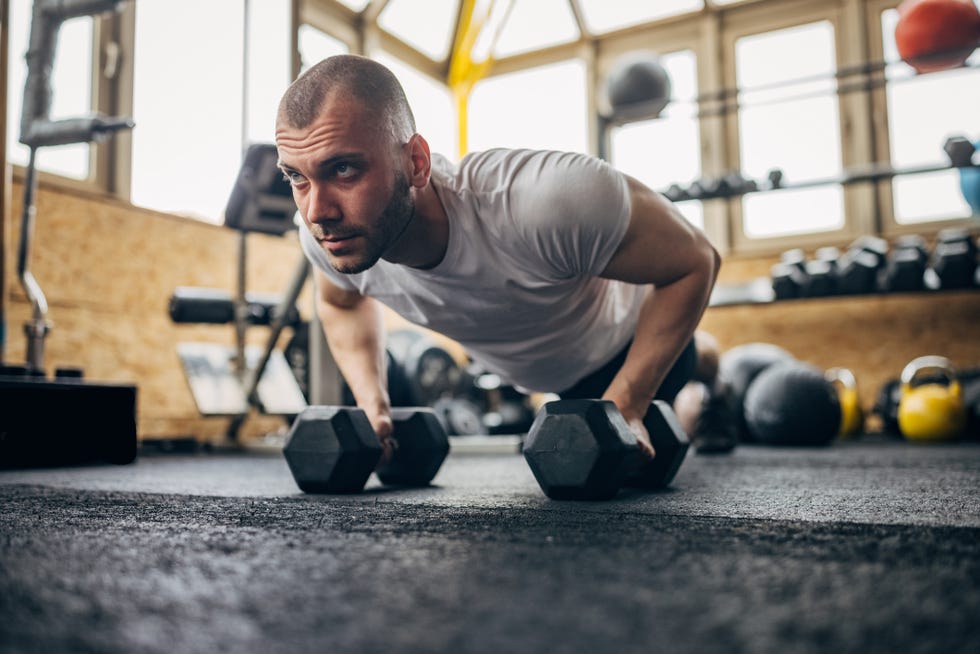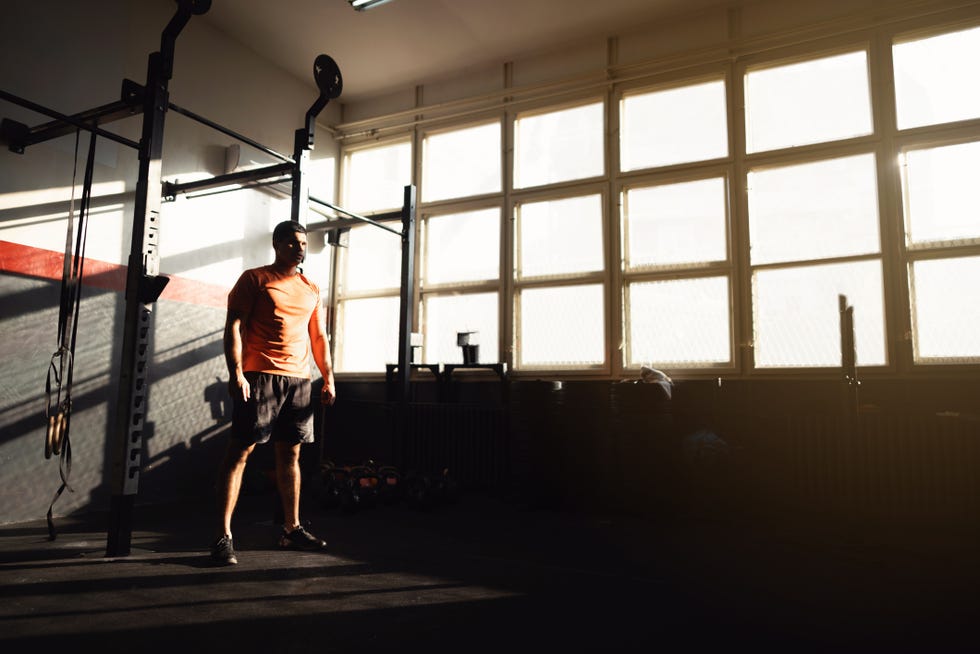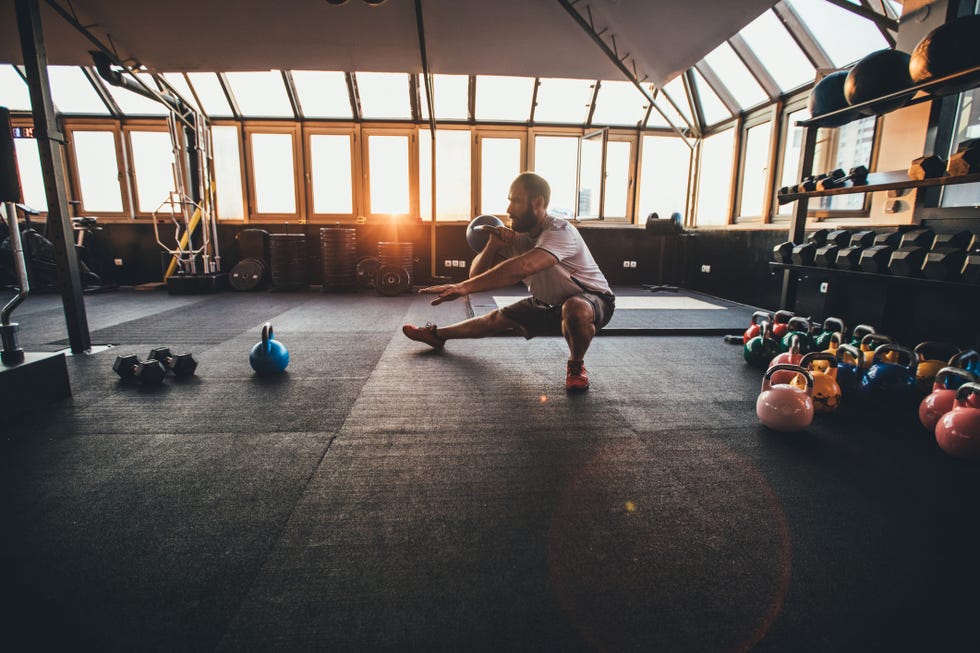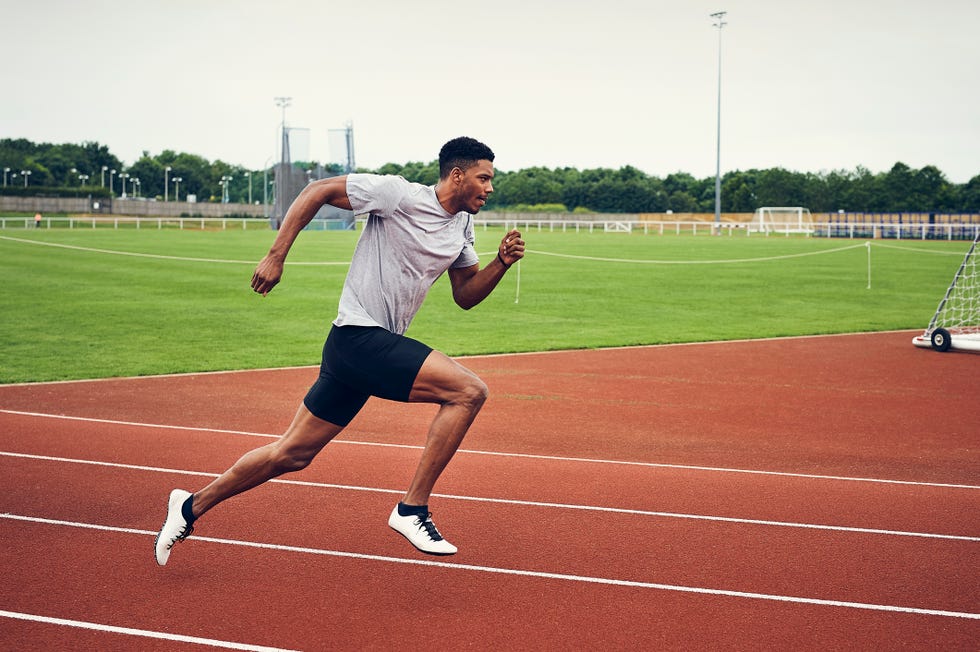WILL YOU GET more gains if you meet the crack of dawn with a 4 a.m. crew workout like Mark Wahlberg? Or can you get just as fit trading your happy hour plans for a swole sesh? Does when you train matter?
The short answer to this time-tested debate about time is usually simple: Whenever you can get your workout in is the best time to do it. But there really is an optimal time to train, according to Shawn Arent, Ph.D., C.S.C.S., chair of the Department of Exercise Science at the University of South Carolina. “The science actually does suggest that there is a slight benefit to time of day for performance,” he says. “The question is, does it matter enough for most people? The answer is: not really.”
Men’s Health fitness director Ebenzer Samuel, C.S.C.S. says, if you can’t fit your workout into that optimal time window—or if trying to means you won’t train consistently—then a small boost in performance doesn’t matter. Schedule your workout when you’ll be able to di it, then build from there.
Here, Arent, Samuel, and Mike Nelson, Ph.D., C.S.C.S., an associate professor at the Carrick Institute, explain why there is a best time to train—but also how to make sure you take advantage of the benefits available to you if you’re able to capitalize on the opportunity. They also explain why other times can be better for certain guys, and why anyone with a competitive goal should consider rearranging their training schedules… at least for a little while.
The Best Time to Work Out
“There is some relevant evidence that shows that peak performance, especially strength and power, tends to occur a little later in the day, specifically mid- to late-afternoon,” Arent says. “So if you’re looking to optimize strength in your training, you’re going to get the most out of it in that window.”
Afternoon training may also be optimal for endurance work. In a research review on the effects of training time published in the Journal of Strength and Conditioning Research this month, scientists concluded that training in the afternoon allowed study participants to work longer before reaching exhaustion.
There are lots of potential reasons why, says Nelson. He references theories about cortisol levels, and the hydration of the discs of the spine. “From a fuel standpoint, you’ve probably had a couple of meals already,” giving you more power for your training, he says. “But if I had to pin it down to one, it’s probably more circadian rhythm related. Most people are just more awake in the afternoon. They’ve probably had some coffee, or another stimulant.”

Hirurg//Getty Images
Should you rearrange your entire life to train in the after-school hours? Probably not. The differences in strength, power, and training efficacy are small, Arent says.
“If I’m working with an elite-level athlete, is there enough for me to say, ‘let’s train a little bit later in the day’? Yes,” he says. “But for most people, it’s just not a big enough difference to matter.”
What About the Benefits of Early Morning Workouts?
One reason some early bird exercisers cite as the reasoning for their dawn training habit is that testosterone levels are thought to be highest in the morning. This might be true—but the effect lessens as you age. Testosterone blood draws are often taken first thing in the morning, because that’s when T levels are the most concentrated. But for men over 45, this change in levels is blunted.
It may not matter, anyway. Even if you are young, having more circulating testosterone during your training session doesn’t seem to make a difference, according to Nelson.

SrdjanPav//Getty Images
In one small study Nelson cites, a dozen participants performed biceps curls with one of their arms on one day, then on the next day performed curls with the other arm, along with a series of heavy leg exercises to raise the amount of testosterone circulating through their bodies. If having more testosterone flowing influenced results, you’d expect the high testosterone arms to grow more in strength and size by the end of the 15-week test period. “At the end of the study, they showed no difference between the right and left arms,” Nelson says. “The hormonal outcome—they do go up. But they don’t seem to do a lot for strength and hypertrophy acutely.”
The Real Best Time to Work Out
It’s not just about getting your workout in whenever you can, according to Samuel. You’ll have the most success when you can establish a schedule—and stick to it.
“The more consistent and regular you can be about the time, as opposed to random times, the more your body and your diet and your mental state are going to be able to adjust to what you’re trying to do,” he says.
Your body will start to have a rhythm where it’s prepared to train at your training time. And, maybe more important, he says, you’ll be ready mentally. This will give you the focus you need to bring full intensity to your workout.
“I think there are two kinds of people here. For one, their entire workday is weighing on them in the morning. So they’re going to rush through their workout because they’re thinking about what’s coming up: They have to go to work, take the kids to school, and everything else that day,” he says. For this guy, afternoon or after work training is probably best.
The other kind of guy, he says, gets caught up in work, and their workout gets skipped. He’s better off knocking out his workout in the morning—even if that means it’s not physically optimal.

South_agency//Getty Images
Nelson agrees: “If you miss just one day per week, then whatever difference you would have gotten by lifting in the afternoon is just going to go away by the fact that you’ve missed a session.” When your workouts are consistently at the same point in the day, Nelson says your body becomes accustomed to training at that time. And studies on changing workout timing back this up: Given enough time to change their training time, their bodies adapt and their performances improve.
There’s one caveat here, though: Weight training late at night may impact your sleep.
“There is good evidence that this can negatively impact your sleep. This is especially if it’s high intensity late in the day, within a few hours of going to bed,” Arent says. Lower-intensity work, though, like going for a walk or moderate aerobic work, can actually help you sleep, he says. So if a late night walk feels good and helps you sleep, go for it.
When Competitive Athletes Should Work Out
Competitions change the calculus of when to work out. Do some of your training at the same time you’ll compete to help acclimate your body to performing at that time of day.
“For anyone I train, the first question I ask is, ‘what time will you compete?’ And the second question is, ‘can you train at that time?’ Because that’s going to be ideal,” Nelson says. “It’s physiological and psychological.”

Matt Lincoln//Getty Images
Acclimating to the competition time in this way means your body and mind will be primed to perform at the time of day when it needs to perform. But if you can’t move your training all year—your competition is in the morning, but your mornings are really busy, for instance—don’t sweat it, Samuel says.
“You don’t need to do this for six months before the competition,” says Samuel. “Dial that in over the last month or two before your competition. If you do, there’s a ton of value to it: You’re remaking your life to be optimized and focus at the time of day when you’ll need that for competition.”
In other words, the best period for training isn’t going to be a rigid moment during the day for everyone, some magic hour where the world should stop and gyms should be packed with guys in the know taking advantage of this secret knowledge. The ideal time to work out is wholly dependent on you and your goals—and when you can do the work that will help you to accomplish them.


Greg Presto
Greg Presto is a fitness and sports reporter and videographer in Washington, DC.
>>> Read full article>>>
Copyright for syndicated content belongs to the linked Source : Men’s Health – https://www.menshealth.com/fitness/a45263948/best-time-to-workout/










